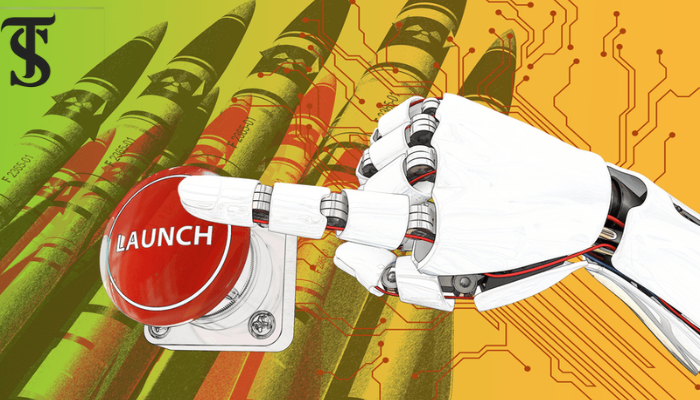Digital Silk Road: Strategic and Economic Benefits for Pakistan

- Enhanced Digital Connectivity: China's Digital Silk Road (DSR) projects, such as PEACE and CPFOP, provide Pakistan with improved internet infrastructure, connecting remote areas and fostering economic growth through e-commerce, education, and job creation.
- Strategic and Economic Benefits: DSR reduces Pakistan's reliance on Western technologies, addressing surveillance concerns by offering alternative routes for internet traffic and supporting smart city developments like Gwadar Smart Port City.
- Criticism of China's Influence: While DSR aids digital growth in developing countries, critics highlight risks of data security, surveillance, digital authoritarianism, and fragmentation of internet governance standards.
States all around the world are increasingly adopting digital technologies and are aligning their geostrategic and geoeconomic interests with emerging technologies. China’s Digital Silk Road (DSR) is one such example and represents China’s concerted attempt to become a technological superpower. DSR is the world’s largest digital infrastructure project, which provides developing countries with affordable digital infrastructure such as data centers, submarine cables, smart cities, and 5G technology. For many countries in the Global South, DSR is an alternative to dependence on the West for access to emerging technologies.
DSR is a flagship project of the Belt and Road Initiative (BRI). While BRI relates to physical connectivity through roads, railways, and seaports, DSR comprises the ‘digitalization of physical infrastructure’. China is utilizing DSR to expand its geostrategic reach, geopolitical influence, and economic power through the development and financing of digital infrastructure in developing countries.
China announced the DSR project in 2015 and rebooted it in 2022 in the aftermath of the Covid-19 pandemic. DSR aims to develop digital infrastructure through improving undersea communication links, boosting e-commerce, and encouraging technology collaboration between China and developing countries. DSR has a global footprint as China has signed agreements with 25 emerging markets and developing economies, which also includes Pakistan.
Pakistan and China signed a MoU in 2017, and both countries have partnered in e-commerce and digital infrastructure projects. China is supporting increased connectivity in Pakistan through Information and Communication Technology (ICT) developments in the China-Pakistan Economic Corridor (CPEC). These digital connectivity projects provide benefits to Pakistan in the strategic and economic realm.
The development of DSR provides an opportunity for emerging economies and developing countries to bridge the ‘digital divide’. In Pakistan, China has invested in two major projects related to the laying of submarine cables for digital connectivity across the country. These projects include the Pakistan East Africa Cable Express (PEACE) and CPFOP (China Pakistan Fiber Optic Project). Through PEACE, China is connecting Asia, Africa, and Europe, starting from the Gwadar port in Pakistan. PEACE is further connected through Gwadar with cities in South Africa, Kenya, the Seychelles, Somalia, Djibouti, Egypt, and eventually France, measuring a total distance of 15,000 km. According to a former IT minister, Dr Umar Saif, the PEACE cable will generate a revenue of USD 400 million per annum.
CPFOP is about land connectivity between China and Pakistan and connects China’s province of Xinjiang with Gwadar. There are two phases in CPFOP. In the first phase, China has laid out a fiber optic cable from Khunjerab Pass to Rawalpindi with a distance of 820 km at a total cost of USD 44 million. The second phase connects Rawalpindi with the port cities of Karachi and Gwadar. Special Communication Organization (SCO), a telecom services provider in Azad Jammu and Kashmir and Gilgit Baltistan, in partnership with Huawei, is laying fiber optic cables at a total cost of USD 240 million.
According to the Director General of the Special Communications Organisation (SCO), Major General Amir Azeem Bajwa, Pakistan’s internet traffic is routed through India, which has resulted in Pakistan expressing concerns over the risk of surveillance and espionage. It is stated that this constitutes a national security threat to Pakistan. PEACE cable would provide Pakistan with an alternative route, which will help avoid potential Indian surveillance and theft of sensitive data.
Through CPFOP, the northern areas of Pakistan will have access to 3G and 4G connectivity, especially Gilgit-Baltistan, Kashmir, and Khyber Pakhtunkhwa. The project will help locals residing in remote areas to use the internet to benefit from educational opportunities and e-commerce, secure information about health services, and start new entrepreneurial activities. CPFOP is also expected to increase economic growth and create jobs in the digital and services domain, particularly for freelancers.
The availability of digital terrestrial multimedia broadcasting (DTMB), which will enable high-definition (HD) transmission even in remote areas, is another aspect of DSR. Taking advantage of the influence of electronic media could help in the development of cultural ties and reinforce national cohesion. Pakistan’s massive youth bulge can benefit from access to the internet, which has emerged as a basic human right in the information age.
As part of DSR, China is also investing in building smart cities. By utilizing modern digital technologies, these smart cities aim to enhance public service delivery and urban administration. In a smart city, public services are digitized, and citizens can access them through mobile apps. For example, in agriculture, a mobile app can help farmers track the health of crops and weather patterns.
In the case of Pakistan, one example of work on smart cities is the Gwadar Smart Port City built by China as part of CPEC. Projects include the construction of new roads, schools, hospitals, and housing under the framework of technology-driven urban administration. High-tech public services, economical energy utilization, and intelligent traffic control are envisioned as features of the smart city. Gwadar Smart Port City is designed to serve as a commercial and logistical hub, connecting Pakistan to regional and international markets.
DSR is assisting developing countries in building their digital infrastructure and consequently is dismantling Western ‘digital hegemony’. DSR has come under criticism and Western countries have accused China of data hacking, espionage, and intelligence gathering. Another criticism of DSR is that it will give China greater control over international standards for digital governance, which may cause the internet to become fragmented and result in different standards for digital rights and internet governance. Critics also contend that DSR could help China in spreading its model of ‘digital authoritarianism’. This includes concerns that Chinese technology could enable governments to implement surveillance systems, restrict internet freedoms, and censor information, which is against democratic norms.
In conclusion, China’s DSR remains a pivotal infrastructure project for Pakistan. Projects such as PEACE and CPFOP provide internet access and service delivery to remote areas, which helps provide employment opportunities for young people. DSR will help Pakistan bridge the digital divide and leverage new digital opportunities in an increasingly interconnected global political economy.
The author holds a degree in International Relations.






